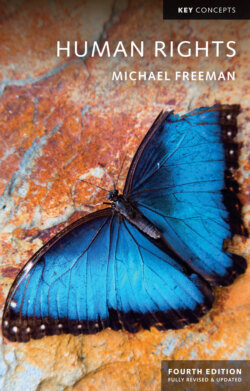Читать книгу Human Rights - Michael Freeman - Страница 11
2 Origins The Rise and Fall of Natural Rights Why history? Which history?
ОглавлениеHuman rights are universal. History relates change. Human rights have a history. The contemporary concept of human rights is a product of that history, but how can a universal concept have a history of change?
The history of human rights itself has a history, which is controversial. Recently, a new generation of historians of human rights has challenged what they call the ‘textbook’ history. This history, according to its critics, is a triumphalist story of progress from superstition and cruelty to rationality and humanity. It is located primarily in Europe and North America, and is consequently a tale of the inevitable triumph of Western liberalism. The story is rendered more plausible by marginalizing the historical connections between liberal rights and colonialism (Halme-Tuomisaari and Slotte 2015).
Samuel Moyn has argued that the ‘deep history’ of human rights, tracing the contemporary concept back to the eighteenth century and beyond, is false. The concept of human rights, on his account, refers to a global morality that became significant only in the 1970s. Earlier conceptions of rights were addressed to different problems and thus had different meanings. For example, the eighteenth-century French revolutionary concept of the Rights of Man affirmed the sovereignty of the nation-state, whereas the concept of human rights seeks to constrain state sovereignty by appealing to a normative order above the state. The earlier concepts could not therefore be the source of the later one. This is the true history of human rights. Moyn believes that the contemporary human-rights movement seeks legitimacy in this false deep history and its supposed inevitability. He admits that there is some continuity in the history of human rights but holds that the discontinuities are more important than the continuities, because they emphasize the role of choice in history, thereby keeping open the possibility of better choices in future (Moyn 2010).
Moyn’s ‘discontinuity’ objection to ‘textbook’ histories of human rights is distinct from the ‘triumphalist’ objection. ‘Deep’ history can, however, be defended against both objections. As a history of Christianity would be absurd without a reference to the life of Jesus, so a history of human rights can be illuminated by tracing its ancient origins. Such an approach does not have to deny the obvious fact that the meaning of rights-language has changed over time, that rights-proposals have often been contested, that the history is one of advances and setbacks, paths taken and opportunities missed, of main roads, side roads and dead ends. The history should assume as little as possible about the merits and limitations of the contemporary concept: evaluation belongs to philosophy not history (see chapter four).
However, before we can study the history of human rights, we must know what it is the history of. We might begin with a definition, but the variety of meanings of human rights across time and space makes an uncontroversial definition difficult. It is better, therefore, to begin the history of human rights with the point of the concept. The contemporary concept of human rights was developed as a response to the abuse of power. This conception of human rights is suitable for deep history because power and its abuse can be found throughout history. The history of human rights can trace the emergence of the idea of universal rights as a solution to this problem. The modern concept differs from earlier rights-concepts, but it is composed of various elements that have their own histories and that have come together in the modern concept.
Some say that the concept of human rights has a universal history. The Code of Hammurabi (c.1792–1750 bc), king of Babylon, is said to be the oldest surviving text establishing the rule of law. Cyrus the Great (died 529 bc), king of Persia, proclaimed a policy of religious toleration and abolished slavery. The Buddhist King Ashoka of India (c.264–238 bc) also promoted religious toleration, provided for the health and education of his people, and appointed officials to prevent wrongful punishments (Weeramantry 1997: 7–8). Thus, principles now associated with human rights can be found in ancient times in many cultures. These examples weaken the claim that the concept of human rights is Western. However, they appear to be evidence of benevolent rulers rather than of human rights as such.
Others maintain that the concept of human rights originated in the West and was universalized only recently. Some argue that, if the history is Western, its validity cannot be universal. Others say that the history of a concept is irrelevant to its validity: there may be good reasons for universalizing a concept that has a particular history.
Some have argued that there could be no concept of individual rights in ancient times, because individuals were considered to be subordinate parts of the social whole. This idea was weakened by increasing social complexity that undermined roles and identities, creating the rights-bearing individual. This historical sociology of individual rights is supposed to discredit the concept of universal human rights. But is it true?
